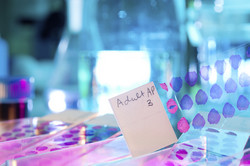A new cancer therapy
Cancer, caused by genetic mutations that result in uncontrolled cell growth, kills 1.7 million people annually in the EU alone. Although many different gene mutations are responsible for different cancers, the biggest single cause of tumour growth is mutations in the tumour suppressor protein p53. Known as the guardian of the genome, functional p53 proteins protect DNA and cells from damage caused by mutations. They do this by activating proteins that repair damaged DNA and by stopping cells from dividing while the repair proteins do their job. If, however, damaged DNA is beyond repair, p53 kills the cells containing the mutant DNA to avoid uncontrolled growth and tumour formation. To do its important job, the p53 molecule needs to take on a particular 3D shape. Mutations that change p53's shape inactivate the protein, leaving the genome unguarded and cell growth unchecked. The idea behind the EU-funded DEVOCAT (Directed evolution of small-molecule cancer therapeutics) project was to develop drugs that can restore the shape of mutated p53, re-establishing its antitumour activity. Researchers engineered bacteria to produce thousands of small molecules with highly diverse chemical activities and structures. They then looked for molecules that bind to mutated p53 to restore its shape. After selecting promising candidates, researchers investigated whether their binding to p53 improved the protein's stability and function. They could not demonstrate in cancer cells that binding to these small molecules restored mutated p53's antitumour activity. Despite this, the ideas behind DEVOCAT offer a promising alternative to standard approaches for cancer therapeutics.







